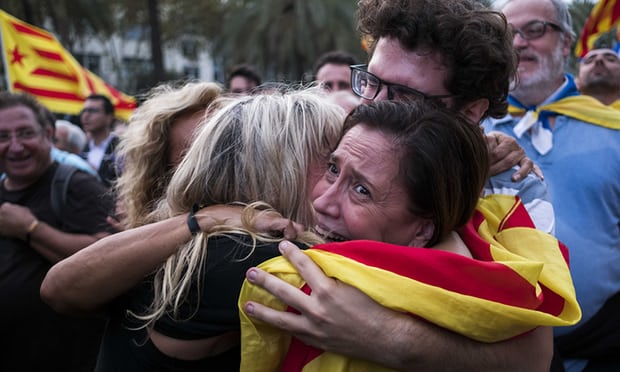12.10.2017 - 21:02
The Spanish prime minister, Mariano Rajoy, is playing hardball with Catalonia’s bid for independence. His first response to the declaration by President Carles Puigdemont that the right to independence was won, but would be suspended in order to create space for “dialogue”, was to challenge Mr Puigdemont to clarify his region’s status. Mr Rajoy has made no secret of his readiness to trigger article 155 of the constitution and suspend the region’s autonomy. Now he has flatly rejected Mr Puigdemont’s call for mediation. He must take care: boxing the Catalan leader into a corner would be a high-risk strategy.
Mr Puigdemont’s decision to pause is both tactical and understandable. There is no clear scenario for secession, and certainly no obvious legal path offered by the 1978 constitution, which proclaims Spain’s “indissoluble unity”. Businesses and banks in Catalonia oppose independence. Some are already moving head offices out of the region: independence would certainly be a recipe for economic disruption. Mr Puigdemont, at least in the eyes of outsiders, also lacks a majority for independence. Although 90% voted for it, the turnout was only 43% (although the government says 770,000 votes were lost in the police violence). His own separatist coalition is increasingly strained.
So Mr Puigdemont was right to hit the pause button. Confrontation has been averted, for now. But Mr Rajoy seems determined to win a total victory rather than try to negotiate despite the appeal from the president of the European council, Donald Tusk, who warned that this crisis can only be solved through “the force of argument, not the argument of force”. The sight, during a pro-Madrid demonstration in Barcelona on Sunday, of the national police, the CNP, being greeted as the allies of the protesters, rather than neutral guardians of law and order, should be a warning of how quickly divisions can become entrenched. The smart move now would be to lower the temperature: that means both sides making concessions.
Mr Puigdemont says that independence is in abeyance. So Mr Rajoy could signal a move towards greater federalism that would take the edge off the antagonism. At all costs, he must resist pressure to implement article 155. Any attempt at direct rule from Madrid would risk precipitating the situation from a constitutional crisis into a catastrophe. There may be a model in Madrid’s relationship with the Basque country, which enjoys greater autonomy, for example being able to raise taxes. More symbolic changes, such as an official acceptance of Catalonia as a “nation” within Spain might win hearts and help protect territorial integrity.
The events of the past weeks should be a warning of how quickly and easily matters can slip out of control. Neither side appears to have had a plan B. Each has staked their personal political prospects on conflict over negotiation. If they truly hold their citizens’ interests at heart, they urgently need to seek common ground, not more divisions.
Spain has been an extraordinary success story for more than four decades. It has emerged from the long shadow of the Franco years as a modern European democracy. Catalonia has been an important part of that democratic triumph, and Spain has become a vital member of the EU. Yet history casts a long shadow. There are ghosts from that era which have not been entirely laid to rest. Barcelona and Madrid alike must take care not to let themselves be imprisoned by them.

